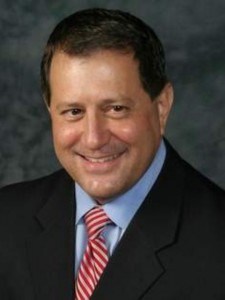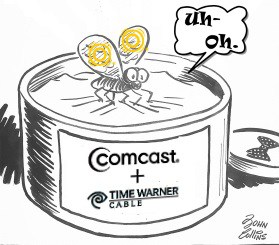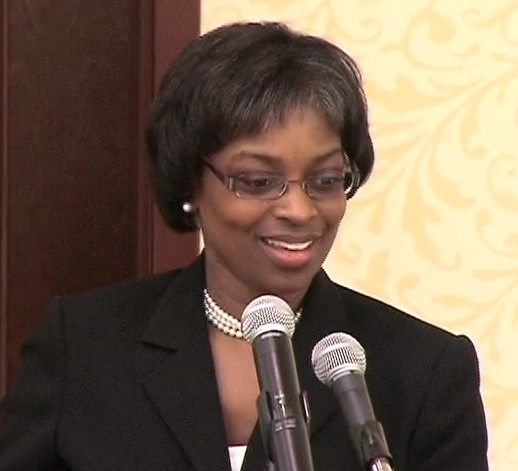
Assemblyman Joe Morelle’s letter to N.Y. regulators failed this online plagiarism checker when it found the majority of the text was lifted from Comcast’s own press statements and congressional testimony, without attribution.
News that Assemblyman Joe Morelle cut and pasted the majority of his letter to New York regulators directly from a Comcast press release and executive testimony before Congress has begun to create some problems for the assemblyman and his office.
The story has been picked up by a Rochester television station, two New York newspapers and the National Journal (so far). We have now learned that Assemblyman Morelle also cashed a $1,000 campaign contribution check from Comcast earlier this year.
In response to our story, the assemblyman’s office today issued a litany of excuses about why it now fronts for Comcast, none of them particularly convincing. In fact, the damage control effort may actually be making the problems for Mr. Morelle and Comcast worse:
WROC-TV:
Sean Hart, said Comcast approached the assemblyman for his support. “They provided a draft letter of support for our consideration. We made several edits of the letter. This is common practice for any organization asking for an elected official’s support to provide a sample letter.”
Comcast is not an “organization.” It is a multi-billion dollar telecommunications and entertainment conglomerate. We are grateful to have confirmation that Comcast is sending out “templates” to elected officials with talking points already prepared and ready to go. The only issue is whether an elected official will steer clear of promoting giant corporate merger deals they don’t understand (and Mr. Morelle clearly does not have a clue.)
Did Mr. Morelle consult with his own constituents before deciding to tote water for Comcast? Not that we are aware of. Even the Public Service Commission’s own staff recognizes the overwhelming majority of New Yorkers communicating with them on this issue (nearly 3,000 and counting), are vehemently opposed to the deal. Many have past personal experiences dealing with Comcast, and they don’t have the benefit of a $1,000 check from the cable company to give them warm feelings of goodwill.
Although it may be common practice for a company to do this kind of advocacy work, it is not common for most elected officials to barely rewrite the company’s own press releases and executive testimony. Out of thousands of elected officials in New York, only a dozen or so have weighed in with the PSC on this issue.
Our favorite attempt at damage control came from Mr. Hart’s comments to The Journal News:
“It is common practice for an organization seeking support to provide a sample letter with suggested language,” Hart wrote. “I am certain if you were to review letters of support for any number of projects/causes submitted by elected officials, at every level of government, you would find that many opt to extract language from a sample letter provided to them.”
Hart rejected the suggestion that Morelle plagiarized the Comcast and Time Warner executives’ testimony, as suggested by Stop the Cap. The letter to the Public Service Commission was signed by Morelle and printed on official Assembly letterhead.
“I realize I probably do not need to point this out to a journalist, but the definition of plagiarism is ‘an act or instance of using or closely imitating the language and thoughts of another author without authorization and the representation of that author’s work as one’s own,'” Hart wrote. “Morelle has authorization from Comcast to use the language included in his letter to the NYSPSC.”
He continued: “It is one thing to disagree with the Majority Leader’s opinion. It is another to make outlandish claims that lack merit.”

Morelle
We have reviewed over 8,000 comments filed with regulators on the state and national level since 2008. We have rarely encountered a cut and paste job as obvious as Mr. Morelle’s letter. When you review as many filings as we do, when talking points are quoted word for word, it stands out because we have heard them from Comcast again and again.
Mr. Hart does not help Mr. Morelle’s cause defending the fact he had Comcast’s permission to cut and paste their press releases in comments sent on the Majority Leader’s letterhead and signed by him personally. Comcast could and should have co-signed it. The fact that it happened at all should ring alarm bells for any voter, particularly those who don’t appreciate an elected official inviting America’s most-hated cable company into New York State.
As for the matter of plagiarism, perhaps we missed the part where Mr. Morelle made sure to credit the source for his testimonial. Oh wait, we didn’t. It wasn’t in there. Would Mr. Hart’s excuses fly by your college professor after being caught cutting and pasting someone else’s words in a paper you ostensibly wrote without any attribution?
Maybe we were wrong, so we decided to run Mr. Morelle’s letter through an online plagiarism checker to see what it thought.
Uh oh: Grammarly not only fired off a warning, but a full-scale “!” plagiarism alert, even after we discounted our own (and others) coverage of the story, which also quotes from his letter.
If Mr. Hart wants to attack us for exposing the sordid affair, we’re fine with that. We’re tough and can take it. He’ll find few (unpaid) defenders of Comcast to stand with the assemblyman.
Frankly, the only “outlandish claims that lack merit” are Comcast’s promises for New York. If Mr. Morelle is that comfortable extending his own credibility to vouch for Comcast, we’ll still be around to remind his constituents the promised dreams of better days inevitably devolved into a consumer nightmare, just as it has in Comcast’s primary service areas. Voters should know Comcast has Joe Morelle’s full and unwavering support.
The best damage control? Rescind the letter. All will be forgiven. Mr. Morelle won’t be the first (or last) elected official suffering collateral damage from Comcast.
 Although Charter Communications did not succeed in its bid to assume control of Time Warner Cable, it isn’t crying about its loss to Comcast either.
Although Charter Communications did not succeed in its bid to assume control of Time Warner Cable, it isn’t crying about its loss to Comcast either.

 Subscribe
Subscribe
 The federal government is likely to count Bright House’s 2.2 million customers as part of the Time Warner Cable family, at least as far as control of cable programming pricing is concerned. Despite Comcast’s voluntary commitment to keep its national share of the cable TV business under 30 percent with the merger of Time Warner, Comcast hasn’t taken seriously counting the customers of the uninvited cousin – Bright House.
The federal government is likely to count Bright House’s 2.2 million customers as part of the Time Warner Cable family, at least as far as control of cable programming pricing is concerned. Despite Comcast’s voluntary commitment to keep its national share of the cable TV business under 30 percent with the merger of Time Warner, Comcast hasn’t taken seriously counting the customers of the uninvited cousin – Bright House.


 David Cohen, executive vice-president, Comcast: “The combination of Comcast and TWC will create a world-class communications, media, and technology company to help meet the insatiable consumer demand for advanced digital services on multiple devices in homes, workplaces, and on-the-go.”
David Cohen, executive vice-president, Comcast: “The combination of Comcast and TWC will create a world-class communications, media, and technology company to help meet the insatiable consumer demand for advanced digital services on multiple devices in homes, workplaces, and on-the-go.” Comcast Press Release: “Through this merger, more American consumers will benefit from technological innovations, including a superior video experience, higher
Comcast Press Release: “Through this merger, more American consumers will benefit from technological innovations, including a superior video experience, higher 
